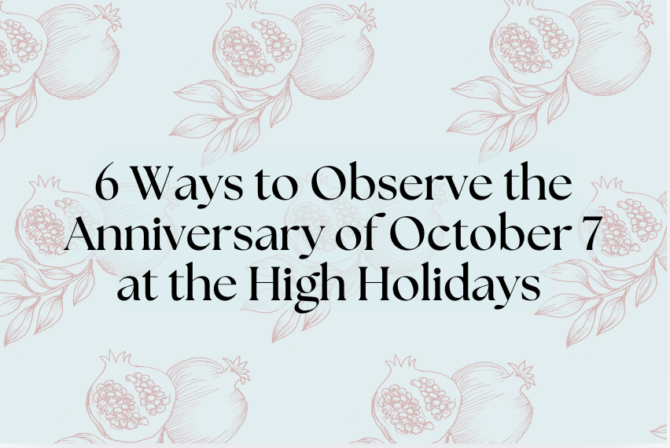When Theodore Ross was 9 years olds, his parents divorced and he moved with his mother from New York City to Mississippi. With that move, his mother decided to hide the fact that they were Jewish. She enrolled Theodore and his brother in Episcopal school where he sang in the choir and took communion. Years later, as an adult, Ross wondered: Am I still Jewish?
Am I a Jew? is Ross’s attempt to answer that question. The book documents his travels to various Jewish communities, including the Crypto-Jews in New Mexico to Monsey, the Ultra-Orthodox town in upstate New York. Below, we talked to Ross about his foggy memory of his childhood religion switch, why there are more mom blogs than dad blogs, and what religion he plans on raising his kids with.
How clearly do you remember your mother telling you about her plan to pretend to be Christian? Were you upset? Confused? Cool with it?
I don’t remember it at all. Really. I remember moving to Mississippi, being sent to an Episcopal school, telling people that I was Unitarian, and participating in church (students at the school went to church every Wednesday). I remember knowing our family’s Judaism was a secret. But I don’t have any memory of being told to do it, or why we weren’t supposed to talk about it. It’s a mental blank, which is why I brought it up with my mother as part of my research for the book. Funny what we suppress, eh? Below is part of a conversation I had with her, which I included in the book, in a chapter entitled, shockingly, “Jewish Mother.” We were driving around her old neighborhood in Queens and discussing her decisions, family background, memories of her childhood—trying to figure out how we ended up in southern Mississippi pretending to be Christian.
—
You decided you were not going to be Jewish when we got to Mississippi.
—
Yes.
—
Do you remember how you decided what you were going tell us?
—
No.
—
Did you give it any thought? What you might say to us about this?
—
I was just going to make it a rule.
—
You realize, Ma, that sort of seems irrational, right?
—
I just don’t remember.
—
Well, I’m asking you to try to remember.
—
I don’t remember. I don’t remember.
—
You don’t remember it at all? That this was the new rule? Think.
—
Yeah, I do remember when we got to Mississippi that I told you and your brother that.
—
What did you tell us?
—
I said don’t tell anybody you’re Jewish.
—
But you have no real recollection of the conversation itself? Because that is like a huge moment in my life and you don’t remember it at all.
—
I don’t think there was one conversation.
—
Really? How did it work?
—
Uh…I just, I think when you started school I said, ‘Listen, just don’t tell anyone you’re Jewish.’
—
And how did we react?
—
You didn’t say anything when I said that. It didn’t come up as a big conversation.
—
We didn’t react.
—
Right.
—
Is that basically it?
—
Yeah.
So that was basically it. I remember being uncomfortable with having to lie because I thought I might get caught, not because I understood the import of pretending not to be Jewish. You know, kids adapt to weird things pretty well—normal is what you present to them as normal. I was nine years old. If my mother wanted me to be a Christian, I sort of figured she had a reason for it, and that was that. It wasn’t until much later that I started to suspect how strange this was.
Your exploration of Judaism has introduced you to an immense variety of Jewish peoples, far beyond the Ashkenazi Jews most people associate with American Jews. What community was your favorite to visit and learn about, and why?
Nope. No “favorites.” That’s an odd sentiment for me to wrestle with. Kinda like saying, ‘Some of my best friends are black.’ Jews are people, too, you know! I played no favorites. I love all Jews.
You are an editor for the great parenting site, DadWagon. Kveller has often bemoaned the lack of men in both our rosters of writers and readers. Why do you think there are less dad bloggers than mom bloggers? Is it important get more men vocal in the parenting community?
That’s more a financial question than anything, I think. Women with children, as opposed to men, are the ones that companies market to—even in these high-minded times, they still do most of the purchasing in households—so advertising, logically, flows to mom-blogs, and not their dad counterparts. In general, most parenting blogs are done for fun, in people’s spare time, and, yes, folks, they tend to be dreadful. To make it professional requires money, and that, again, basically, only goes to the mommies. No surprise then, I think, to find more mom blogs—a potential professional payoff exists at the end. Is that important? Do we need more dad blogs? No—DadWagon exists. What possible need could anyone have for more?
Will you raise your children to be Jewish? Or will you raise them with a similarly confusing upbringing, only to encourage them to go on a soul-searching journey later in life and write a book about it?
Similarly confusing, although instead of a book, I’m expecting a lawsuit. No, seriously, I have three children, two with my wife, and one with my ex-wife. Neither of the women I’ve married are Jewish, so that creates some complexity in its own right. But, the children are as Jewish they can be, given the circumstances, and by that I mean a blended family, not a father with a loco history of Judaic oddity. We light candles at Hanukkah, we have a Seder at Passover, and everyone in the entire family yells at each other at public gatherings. Jewish! Most important, though, I am confident that the kids, when asked about their religion, unlike me—they won’t lie. Their answer? I have no idea. But it will be true for them.
How have friends and relatives reacted to your book? Were most aware of the role that religion has played in your life?
Short answer to those questions: Fine, and no. Longer answer: Most members of my family, my father included (My parents divorced when I was very young, and I moved to Mississippi with my mother), had no idea about any of the stuff mentioned in my book—pretending not to be Jewish, taking Communion, singing lead in the choir—until they read
Am I a Jew?
I think the fact that the book isn’t an attack—I love my mother and admire her, even if I think she was nuts to have us do what she did—helps. But, yeah, my father was shocked, sometimes hurt, and definitely confused by learning of my past in this way. My brother, on the hand, who was with me throughout this experience, I think he enjoyed it. We are close in age, so in some sense my thoughts are his, and I was putting a voice to the things we had experienced. On the other hand, of course, he remembered things differently than me. I won’t go into his differences, other than to say that he’s totally wrong and I remember everything perfectly and he should shut up and leave me alone. (He’s my older brother. Can you tell?)
Are you a kveller?
I am kvelling as we speak. I kvell like nobody’s business. I don’t understand the question.







